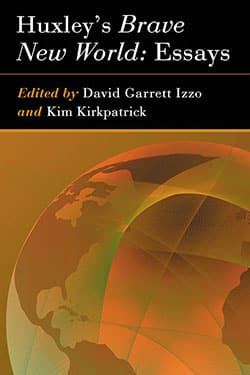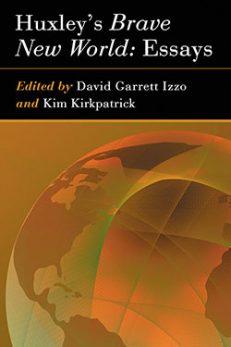Huxley’s Brave New World: Essays
$29.95
In stock
About the Book
Aldous Huxley’s prophetic novel of ideas warned of a terrible future then 600 years away. Though Brave New World was published less than a century ago in 1932, many elements of the novel’s dystopic future now seem an eerily familiar part of life in the 21st century.
These essays analyze the influence of Brave New World as a literary and philosophical document and describe how Huxley forecast the problems of late capitalism. Topics include the anti-utopian ideals represented by the rigid caste system depicted, the novel’s influence on the philosophy of “culture industry” philosophers Max Horkheimer and Theodor Adorno, the Nietzschean birth of tragedy in the novel’s penultimate scene, and the relationship of the novel to other dystopian works.
About the Author(s)
Bibliographic Details
Edited by David Garrett Izzo and Kim Kirkpatrick
Format: softcover (6 x 9)
Pages: 196
Bibliographic Info: notes, bibliographies, index
Copyright Date: 2008
pISBN: 978-0-7864-3683-5
eISBN: 978-0-7864-8003-6
Imprint: McFarland
Table of Contents
Introduction (DAVID GARRETT IZZO) 1
1. The Nonconformers Pause and Say: “There’s Gotta Be Something More” (COLEMAN CARROLL MYRON) 11
2. Political Repression and Sexual Freedom in Brave New World and 1984 (GAVIN MILLER) 17
3. Oedipus Against Freud: Humanism and the Problem of Desire in Brave New World (BRADLEY W. BUCHANAN) 26
4. Some Kind of Brave New World: Humans, Society and Nature in the Dystopian Interpretations of Huxley and Orwell (ANGELO ARCIERO) 46
5. “Laboring for a Brave New World: Our Ford and the Epsilons” (SCOTT PELLER) 62
6. Words Have to Mean Something More: Folkloric Reading in Brave New World (SEAN A. WITTERS) 73
7. Brave New World and Ralph Ellison’s Invisible Man (JOHN COUGHLIN) 88
8. “O brave new world that has no poets in it”: Shakespeare and Scientific Utopia in Brave New World (PAUL SMETHURST) 96
9. The Birth of Tragedy and the Dionysian Principle in Brave New World (KIM KIRKPATRICK) 107
10. To Reflect, to Sit Down: The Hinzutretende and Huxleyan Characters in Horkheimer’s and Adorno’s Philosophy (ANGELA HOLZER) 117
11. Brave New World as Prototypical Musicalized Fiction (THEO GARNEAU) 132
12. Deconstructing the Savage Reservation in Brave New World (KATHERINE TOY MILLER) 145
13. The Eternal Now of Brave New World: Huxley, Joseph Campbell, and The Perennial Philosophy (ROBERT COMBS) 161
14. “Everyone Belongs to Everyone Else”: The Influence of Brave New World on Cinema (JAMES FISHER) 172
About the Contributors 183
Index 187
Book Reviews & Awards
“interesting, accessible collection…recommended”—Choice.





